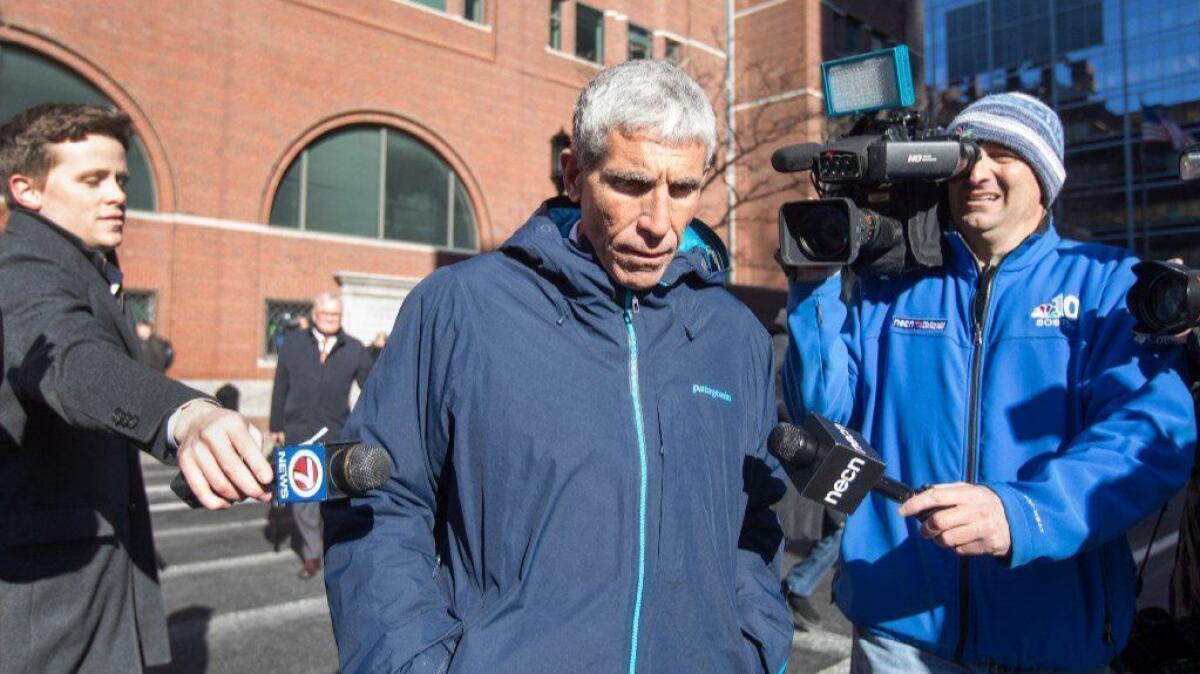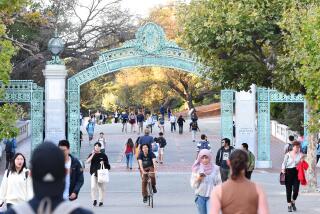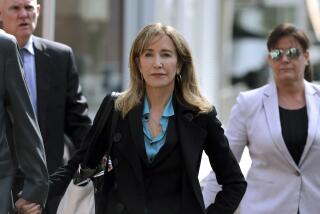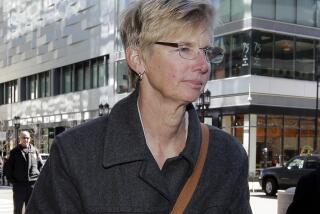As he faked students’ resumes, college admissions scandal mastermind appears to have fudged his credentials too

William “Rick” Singer was well into orchestrating an elaborate bribery and cheating scheme to slip his clients’ children into elite colleges when he sat down for a deposition in Washington, D.C., in 2016.
Asked why he should be considered an expert in the field of college admissions, Singer outlined his credentials: He had worked on admissions committees for UCLA, UC Davis, the University of Miami and other colleges, helping to decide which students should be offered spots.
He claimed to know what colleges did and did not want in an applicant. Parents sought him out, Singer said, because they “want to have an edge and have an expert that understands both sides of the equation,” according to a transcript of the proceeding obtained by The Times.
But the claim appears to be dubious. All but one of the schools Singer named in the deposition denied that he ever played a role in advising whom to admit and whom to turn away.
The episode offers a window into how Singer sold himself as an authority, a self-described “master coach” who could steer his clients’ children through the narrows of the application process.
Sitting in a law office that October morning, Singer was still two years from being nabbed as the mastermind of what authorities have called the largest college admissions scam ever uncovered by U.S. law enforcement.
Full coverage: Dozens charged in connection with college admissions scandal »
Instead he was flying high among the rich and influential in Silicon Valley, Hollywood and other circles, known by parents as a must-have guru.
It was this reputation that brought him to the nation’s capital, the expert witness for an exclusive private high school that believed Singer could help fend off a lawsuit filed by a former student.
After being turned down by more than a dozen top-tier universities, an African American graduate of the Sidwell Friends School and her parents sued, accusing teachers and administrators of discriminating and retaliating against the teen in ways that had torpedoed her chances of getting into college.
Sidwell turned to Singer, paying him $300 an hour to give his opinion on why the girl had had not been admitted to Harvard, Yale, Columbia and several other universities. He delivered a report that concluded that the girl’s grades, extracurricular activities and performance as a track and field athlete fell short of the schools’ standards.
In preparation for a possible trial, the lawyer representing the family, Richard C. Baker, deposed Singer for about six hours, according to the transcript. It was a contentious faceoff, with Baker hammering on Singer in an attempt to show that he was unqualified to opine about the girl’s qualifications and that he had done a shoddy job reviewing her academic and athletic record.
Early in the deposition, Baker pressed Singer on his work experience in higher education and asked whether he had “ever been part of a college admissions committee … designated by a college or university to make admissions decisions or recommendations?”
“Yes, sir,” Singer replied. “Chapman University; the University of California, Davis; University of California, L.A.; University of Miami; Dillard University.”
At UCLA, Singer elaborated, his duties had been to “score the applicant” after reviewing a prospective student’s application, transcripts and personal essays. He described doing similar work for UC Davis.
Singer told Baker that “several members of the admissions institution” at UCLA had asked for his help. When pressed, however, he couldn’t recall any names. Nor could he remember who had recruited him to Davis.
When asked by The Times, spokespeople for both California universities said Singer has never served on an admissions committee or taken part in other aspects of their admissions processes.
Similarly, officials at the University of Miami and at Chapman University in Orange County said Singer was never involved in deciding who was granted or denied a spot.
Regarding Chapman, Singer said he had been responsible for reading and scoring applications submitted by students from a particular part of the country, along with serving as “a consultant to help them with international admissions.”
Asked by Baker which years he had worked for the university, Singer was vague, saying only that it was “several years ago.”
“Do you have a problem with your memory?” Baker asked at one point.
Singer replied, “There are certain things I want to remember, and certain things I don’t.”
He went into the most detail about the work he said he did for Marvalene Hughes, former president of Dillard, a historically black college in New Orleans.
After Hurricane Katrina, Singer said, he worked with Hughes to help the school with admissions decisions and to develop strategies for luring back students who had fled for good after the devastating storm inundated their campus.
Reached by phone, Hughes said she had no recollection of Singer. She checked with a former colleague, who recalled Singer had been hired as a consultant by the school’s development office in the wake of Katrina, but the colleague did not know what the assignment entailed, Hughes said. Dillard officials did not return calls for comment.
With the exception of Dillard, Singer said, he served on the schools’ admissions committees on a volunteer basis.
Donald Heller, Singer’s attorney in his criminal case, said: “Over the years, Rick provided services to different universities as a volunteer in viewing applications. What he said he did for Dillard is part of the record at Dillard, and he’s comfortable with what he said in the deposition.”
He declined to comment on Singer’s claims of working with admissions committees at UCLA, UC Davis, Chapman and Miami.
During the deposition, Baker asked Singer about his education and training in college counseling. A spokeswoman for the University of La Verne confirmed Singer’s claim that he had received a master’s degree in school counseling in 1992. Singer also told Baker he had later enrolled in a doctoral program at Capella University but did not earn his degree.
A Capella official said a person with Singer’s name was enrolled in the organization and management PhD program between 1999 and 2002 and left before completing the degree.
Singer conceded to Baker that he had never worked as a college admissions counselor at a high school and was not a member of the National Assn. for College Admission Counseling, the industry’s main membership organization.
But he stood on what he said was extensive hands-on experience that qualified him as an expert. Singer said he had counseled “tens of thousands” of students on getting into college and had given more than 1,000 seminars on college admissions in cities throughout India, China, Russia and the U.S. Singer said at least two students in the 2014 girls class at Sidwell had been his clients, but he claimed not to recall their names.
The family lost their lawsuit as well as an appeal. Baker has petitioned the U.S. Supreme Court to take the case. When told the universities refuted Singer’s claims, Baker declined to comment.
Singer pleaded guilty to four felonies in March. He has acknowledged rigging entrance exams and bribing university coaches, who gave Singer’s clients spots reserved for student-athletes in exchange for six-figure sums. Fifty people have been charged in the case, including 33 parents and 10 coaches.
More to Read
Start your day right
Sign up for Essential California for news, features and recommendations from the L.A. Times and beyond in your inbox six days a week.
You may occasionally receive promotional content from the Los Angeles Times.







